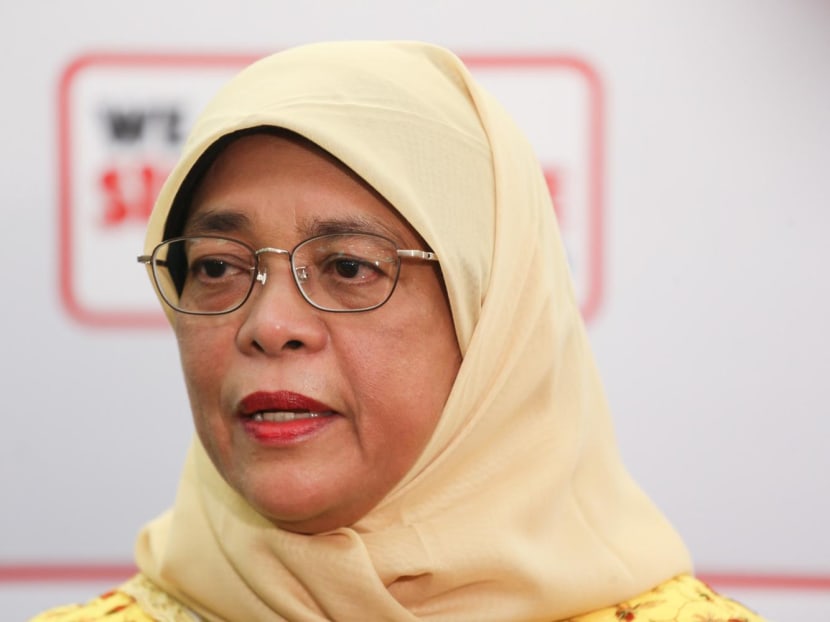Law against sacking workers due to old age ‘largely misunderstood’ and should stay: President Halimah
SINGAPORE — President Halimah Yacob expressed her support for a law against sacking workers due to old age and said that it should stay despite some concerns aired in Parliament that it is a "double-edged sword" and could backfire.

- The Retirement and Re-employment Act should stay despite concerns that it could be a "double-edged sword", President Halimah Yacob said in a Facebook post
- The president was responding to MP Jessica Tan’s speech in Parliament earlier in the week, in which she said that the law could backfire
- Ms Tan quoted findings from focus group discussions with human resource professionals as part of a survey by the PAP Seniors Group
- President Halimah used to be the chairperson of the PAP Seniors Group
SINGAPORE — President Halimah Yacob expressed her support for a law against sacking workers due to old age and said that it should stay despite some concerns aired in Parliament that it is a "double-edged sword" and could backfire.
Referring to the Retirement and Re-employment Act in a Facebook post on Friday (Oct 7), President Halimah said: "I hope that the law will not be changed to remove that protection as it would render the legislation meaningless."
She also said that this Act is "often cited but it remains a piece of legislation that’s largely misunderstood".
By law, employers are required to rehire an eligible employee who has reached the retirement age of 63, up to the re-employment age of 68.
President Halimah said: "To ensure that companies do not get around this law and terminate an older employee before he reaches his retirement age, the law provides that it’s an offence for an employer to do so.
"But it does not affect an employer’s ability to terminate an older employee on account of proven misconduct or incompetence or other valid reasons related to the performance of his duties regardless of his age."
She also said that she was "involved in the original Act that was passed for the first time in our history to stipulate a minimum retirement age".
As a graduate, President Halimah first worked for the National Trades Union Congress (NTUC) in 1978 and spent 33 years with it, becoming its deputy secretary-general from 2007 to 2011.
In 1993, the Retirement Age Act was passed, which mandated a retirement age of 60.
"Previous to that, the norm was to retire people at 55 years old or, in the case of unionised workers, at 60 years old under the collective agreements. With a shrinking workforce, that was untenable when people were still productive and could continue to contribute. So the law provided a minimum retirement age of 60 years," she added.
"The retirement age today is 63 years. Employers are at liberty to retire people at a much later age."
She said that with the latest requirements of the law now, the position remains the same that it does not affect an employer’s ability to terminate an older worker if the worker is incompetent or there are other valid reasons related to work performance.
"The law already provides a mechanism to deal with issues arising from older workers’ contention of wrongful dismissal on account of age and employers’ assertion that the reasons are work-related.
"It’s in both the workers’ and employers’ interest to maintain this provision."
President Halimah was responding to Ms Jessica Tan’s adjournment motion in Parliament on Wednesday.
During her speech, Ms Tan, who is Member of Parliament for East Coast Group Representation Constituency, said then that focus group discussions with human resource professionals as part of a survey by the People’s Action Party (PAP) Seniors Group had found that the law is “a double-edged sword” when it comes to recruiting older workers.
It has resulted in employers having an “unconscious bias” when hiring seniors for job roles, she said.
“As a company considers hiring someone who is senior and has little runway to retirement, (the employer) may see it as a risk to hire a person if he or she turns out not to be a good fit for the role, because the company will then be required to offer re-employment for the person when he or she reaches retirement age,” Ms Tan said in her speech.
In her Facebook post on Friday, President Halimah, who was the former chairperson of the PAP Seniors Group, said that another element to ensure that the law governing the retirement age is effective is to provide structured training to older workers so that they remain fit to do their jobs when companies restructure or automate.
“And that training should not start only when they are about to retire. It should be part of a company’s policy, in its own interest, to consistently develop every worker that it employs to realise their fullest potential.”
She added that she hoped more employers will continue to provide older workers with meaningful job opportunities.
TODAY has reached out to Ms Tan for comment.
WHAT NTUC SAYS
Responding to Ms Tan's adjournment motion, Mr Heng Chee How, deputy secretary-general of NTUC, said that the union has "fought hard" to include in the Act the requirement that no worker can be dismissed from work due to their age before their retirement and re-employment ages.
He added that the employability of all workers rests on the fair and objective assessments of their conduct, skills and performance.
"It behoves the management and tripartite partners to enable workers to continually upgrade their skills and do well at work."
He said that NTUC also takes effort to ensure the smooth implementation of higher retirement and re-employment ages, as well as enhanced Central Provident Fund contribution rates for older workers.
The union is looking to deepen its understanding in areas such as fairness at work and retirement adequacy for older workers.
"We will resolutely defend fair protection for our older workers together with tripartite partners," Mr Heng said.











